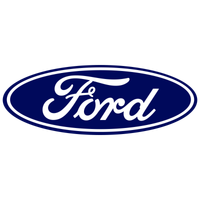
Ford Motor Co
NYSE:F

Intrinsic Value
The intrinsic value of one
 F
stock under the Base Case scenario is
16.36
USD.
Compared to the current market price of 9.63 USD,
Ford Motor Co
is
Undervalued by 41%.
F
stock under the Base Case scenario is
16.36
USD.
Compared to the current market price of 9.63 USD,
Ford Motor Co
is
Undervalued by 41%.
The Intrinsic Value is calculated as the average of DCF and Relative values:

Valuation History
Ford Motor Co

Fundamental Analysis

Ford faces pressure from rising labor costs and potentially disruptive labor disputes with its unionized workforce, which could erode margins and slow investment in electric and autonomous initiatives.
Ford’s F-Series trucks remain industry-leading in the United States, generating consistently strong margins and providing a dependable cash flow anchor to fund the company’s broader vehicle electrification strategy.

Revenue & Expenses Breakdown
Ford Motor Co

Balance Sheet Decomposition
Ford Motor Co

| Current Assets | 124.5B |
| Cash & Short-Term Investments | 38.3B |
| Receivables | 66.9B |
| Other Current Assets | 19.2B |
| Non-Current Assets | 160.7B |
| Long-Term Investments | 6.8B |
| PP&E | 67.2B |
| Intangibles | 658m |
| Other Non-Current Assets | 86.1B |
Free Cash Flow Analysis
Ford Motor Co

| USD | |
| Free Cash Flow | USD |
Earnings Waterfall
Ford Motor Co

|
Revenue
|
185B
USD
|
|
Cost of Revenue
|
-169.5B
USD
|
|
Gross Profit
|
15.5B
USD
|
|
Operating Expenses
|
-10.3B
USD
|
|
Operating Income
|
5.2B
USD
|
|
Other Expenses
|
660m
USD
|
|
Net Income
|
5.9B
USD
|
F Profitability Score
Profitability Due Diligence

Ford Motor Co's profitability score is 47/100. The higher the profitability score, the more profitable the company is.

Score
Ford Motor Co's profitability score is 47/100. The higher the profitability score, the more profitable the company is.
F Solvency Score
Solvency Due Diligence

Ford Motor Co's solvency score is 27/100. The higher the solvency score, the more solvent the company is.

Score
Ford Motor Co's solvency score is 27/100. The higher the solvency score, the more solvent the company is.
Wall St
Price Targets
F Price Targets Summary
Ford Motor Co

According to Wall Street analysts, the average 1-year price target for
 F
is 10.25 USD
with a low forecast of 8.08 USD and a high forecast of 16.28 USD.
F
is 10.25 USD
with a low forecast of 8.08 USD and a high forecast of 16.28 USD.
Dividends
Current shareholder yield for  F is
.
F is
.
Shareholder yield represents the total return a company provides to its shareholders, calculated as the sum of dividend yield, buyback yield, and debt paydown yield. What is shareholder yield?
The intrinsic value of one
 F
stock under the Base Case scenario is
16.36
USD.
F
stock under the Base Case scenario is
16.36
USD.
Compared to the current market price of 9.63 USD,
 Ford Motor Co
is
Undervalued by 41%.
Ford Motor Co
is
Undervalued by 41%.























































 You don't have any saved screeners yet
You don't have any saved screeners yet